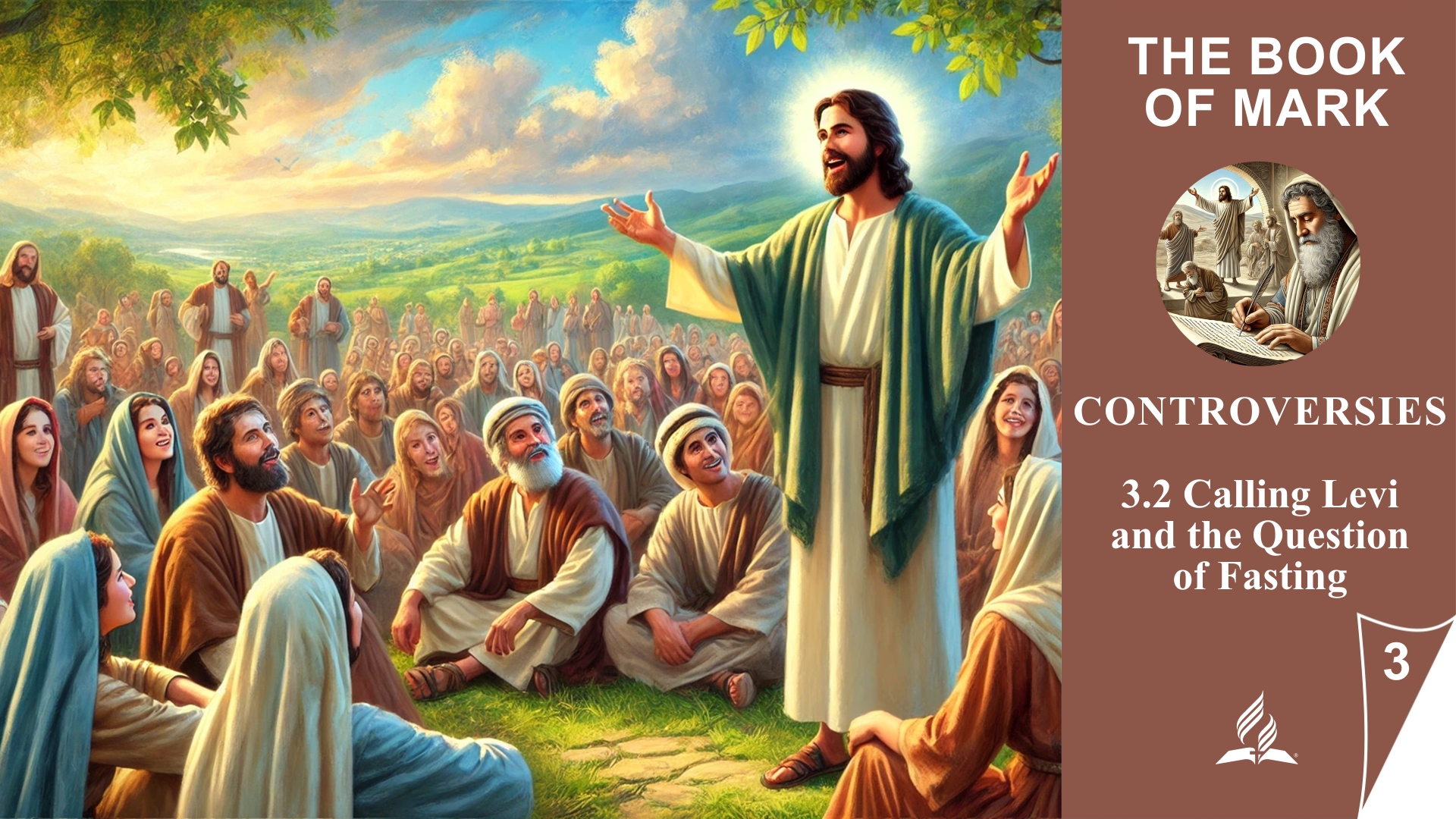


3.2 Calling Levi and the Question of Fasting
The Calling of Levi and Jesus’ Teaching on Fasting
Read Mark 2:13-22. Who was Levi, the son of Alphaeus, and why were there objections to him becoming a follower of Jesus?
In Mark 2:13-22, we meet Levi, the son of Alphaeus, who is called by Jesus to be one of his disciples. Levi was a tax collector, a profession looked upon with disdain and contempt during Jesus’ time. Tax collectors were seen as collaborators with the Roman occupying power and were often known to exploit their position for personal gain. This explains the strong opposition to Jesus’ decision to eat with Levi and call him to be a follower.
The Pharisees and scribes, who strictly monitored adherence to Jewish laws and purity regulations, were outraged that Jesus would associate with someone like Levi. Their question, “Why does he eat with tax collectors and sinners?” reflects their belief that a devout Jew should avoid contact with such individuals to remain pure.
Jesus’ response to this question is profoundly significant and demonstrates his mission and understanding of grace: “It is not the healthy who need a doctor, but the sick. I have not come to call the righteous, but sinners.” Jesus portrays himself as a spiritual doctor, here to heal those trapped in sin and despair. His presence among tax collectors and sinners is not an endorsement of their actions but an expression of his healing mission.
In the second part of this passage, Mark 2:18-22, the issue of fasting is addressed. The disciples of John the Baptist and the Pharisees fast regularly, while Jesus’ disciples do not. Jesus uses this opportunity to highlight the difference between his mission and that of the religious leaders. He compares his presence to a wedding, where fasting would be inappropriate. The time for fasting will come when the bridegroom—an allusion to Jesus’ death—is taken away.
Using the images of new cloth on an old garment and new wine in old wineskins, Jesus illustrates the incompatibility of his new teaching with the old traditions and notions of the religious leaders. These parables emphasize that Jesus’ message and the way he proclaims the Kingdom of God are radically new and cannot simply fit into the old, rigid structures of the existing religion.
These passages encourage us to reflect on the radical nature and inclusivity of Jesus’ message. They call us to move beyond rigid religious forms and be open to the transformative power of the Gospel. Jesus shows us that true religion lies not in outward rituals but in the love, grace, and mercy that he embodies and teaches.

The calling of Levi and the subsequent discussion on fasting provide profound insights that can be applied to our daily lives and faith. Here are some connections:
-
Inclusivity and Mercy:
-
Practical Application: Just as Jesus called Levi, a despised tax collector, we should not exclude people in our surroundings based on their past or social status. This challenges us to welcome people with open arms and include them in our community.
-
Compassion and Acceptance: Our daily lives should be marked by compassion and a willingness to give others a second chance. Whether in the workplace, school, or church, we should strive to be welcoming and supportive.
-
-
Faith that Overcomes Barriers:
-
Taking Initiative: The friends of the paralyzed man and Levi himself showed courage and determination. In our daily lives, we should not shy away from challenges but take bold steps in faith to bring God’s love and healing.
-
Following God’s Call: Be open to how and where God calls you, even if it lies outside your comfort zone or challenges societal norms.
-
-
Flexibility in Faith:
-
Recognizing New Ways: Jesus compares his presence to a wedding, where fasting would be inappropriate. This reminds us that there are times when we must be flexible and adaptable to respond to God’s guidance.
-
Questioning Traditions: We should be willing to question our religious traditions and practices to ensure they align with the spirit of the Gospel and do not become rigid rituals.
-
-
Setting Priorities:
-
Living Important Values: Jesus emphasizes that he came to call sinners, not the righteous. In our lives, we should focus on mercy, justice, and love rather than on external religious duties.
-
Authentic Faith: Our faith should be reflected in genuine relationships and actions that embody God’s love and grace.
-
-
Faith in Community:
-
Strengthening Community: Jesus spent time with Levi and his friends, who were socially ostracized. We should strive to build bridges in our community and integrate people from all walks of life.
-
Shared Celebrations and Mournings: Recognize the importance of community times, whether in joy or sorrow. Support each other in different life phases and be present in each other’s lives.
-
-
Signs of the New Covenant:
-
New Life: The parables of new cloth and new wine in old wineskins remind us that our life in faith should continually experience renewal. Be open to God’s renewal in your life and leave behind old, hindering patterns.
-
Openness to Change: Allow God to do new things in your life, and be ready to leave behind old structures and mindsets that no longer fit the true spirit of the Gospel.
-
By implementing these principles in our daily lives, we can lead a vibrant, inclusive, and dynamic faith life that aligns with the values and teachings of Jesus. The story of Levi and the question of fasting encourage us to be flexible, merciful, and open to God’s new ways in our lives.

Let us be flexible and merciful in our faith, welcoming people like Jesus did and questioning traditions to make God’s love and grace visible in our daily lives.
(Visited 13 times, 1 visits today)




















